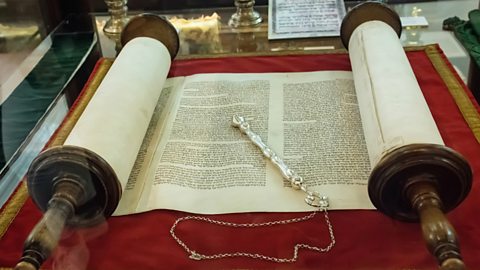Mitzvot
The mitzvotCommandments or laws in Judaism. are Jewish laws. There are 613 mitzvot in the TorahLaw; teaching. The word Torah can be used in a narrow sense to mean the first five books of the Hebrew Bible (The Five Books of Moses) and also in a wider sense to include the whole of the Hebrew Bible and the Talmud. and they guide Jews on how to live a good life. Jews believe that God gave the mitzvot to MosesThe man chosen by God to save the Jews from slavery and take them to the promised land. In the Qur'an he is a messenger chosen by God to give the revelation of the Torah to the Israelites. and that they formed part of the covenant at Mount SinaiA mountain in the Sinai desert, believed to be where Moses received the Ten Commandments..
Jews believe that disobeying the mitzvot will result in punishment.

The mitzvot can be split into two categories:
- 248 of the mitzvot are positive and tell Jews what they should do.
- 365 of the mitzvot are negative and tell Jews what they should not do.
The Sefer Madda
MaimonidesRabbi Moses ben Maimon (1135 - 1204), a leading Jewish philosopher, medical writer and codifer of Jewish law., an influential rabbi, compiled a list of the 613 mitzvot. He wanted to provide a summary of Jewish law. This list is in the Sefer Madda or Book of Knowledge, which is found within the Mishneh TorahA code of Jewish religious law written by Moses Maimonides, a leading twelfth-century rabbi.. The Sefer Madda explains that the foundation of everything is God and therefore moral principles should also originate from God.
The mitzvot and free will
Most Jews believe that when God created them, he gave them free willThe idea that humans are free to make their own moral choices.. This is the idea that people are able to make their own decisions and distinguish right from wrong. Therefore, Jews believe that it is an individualтs responsibility to follow the mitzvot.
Jews also believe that God will judge them on how well they have kept his laws. They will be rewarded if they choose to do good and obey the mitzvot, whereas they will be punished if they disobey the mitzvot.
Question
Explain why Jews believe it is important to follow the mitzvot.
Jews believe that Moses received the mitzvot from God. Therefore, following the mitzvot will help them to live a good life as God would want. Jews also believe they were given free will by God in order to enable them to choose between right and wrong. Jews who use their free will to obey the mitzvot will be rewarded by God.